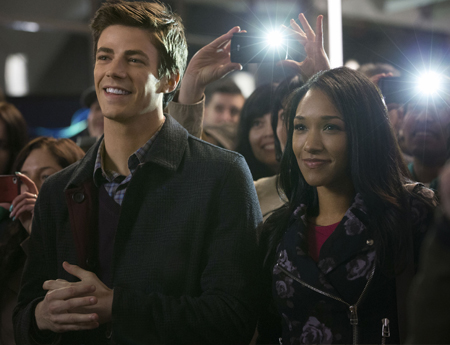TV Hails the Conquering Comic Book Hero

The smarter way to stay on top of broadcasting and cable industry. Sign up below
You are now subscribed
Your newsletter sign-up was successful
The CW’s Arrow was producer DC Entertainment’s only show on television last season. This season, the company is scheduled to have five, with Arrow joined by new series Gotham (Fox), The Flash (CW), Constantine (NBC) and iZombie (CW). Next season, that number could grow even higher. DC Entertainment has sold pilots for Lucifer and Supergirl to Fox and CBS, respectively, each with a financial penalty attached should the projects not air. The company is also looking to expand into cable, and is in varying stages of development for Titans (TNT), Scalped (WGN America) and DMZ (Syfy).
“The success of Arrow certainly helped, and [Marvel’s Agents of S.H.I.E.L.D.],” says DC Entertainment chief creative officer Geoff Johns, giving a nod to rival Marvel when asked to explain the sudden boom of comic book-based shows. While Marvel beat its distinguished competition out of the gate at the box-office with its multi-pronged Avengers franchise, in television, DC has the more aggressive slate. Marvel can claim only two current series— S.H.I.E.L.D. and the forthcoming Marvel’s Agent Carter, both on corporate cousin ABC—and a deal to develop four new series for Netflix.
In 2009, parent company Warner Bros. formed DC Entertainment under president Diane Nelson to oversee brands DC Comics—the publisher behind characters such as Batman and Superman—Mad magazine and non-superhero publishing imprint Vertigo, with an eye toward leveraging their properties in television and film. Johns, a comics writer who began his career as an assistant to Richard Donner and has written for Robot Chicken and Smallville, was named CCO the following year. He spoke with B&C programming and digital media editor Daniel Holloway about DC Entertainment’s television strategy, why it’s coming to such fast fruition and what the company has going for it besides superheroes.
What is the relationship between DC and the television shows based on your properties? You’re not just licensing these characters out then walking away.
We work very closely with Warner Bros. Television and with all of the producers and writers on the shows and throughout the development and the production. It’s a really important partnership for us, and the fact that [Warner Bros. Television CEO] Peter Roth is such a huge fan of the characters in the comics and embraces this stuff, and his whole team does too—when you have someone like that running television, there’s a reason we have all of this stuff running and the support to make it as good as it can be.
What is your role when it comes to TV?
I work with a great team at DC, and every season we sit down with [Warner Bros. Television executive VP of development] Susan Rovner and Peter and talk about what properties or characters, whether they be Vertigo or Mad or DC, that we think could be great TV shows. We all settle on what we think could be good ones together, and we start developing with them and working with writers. And we also work with some producers who have the ideas and come to us—some have producing deals at Warner TV and have a property they love. And now Susan Rovner is running Warner Horizon too, so we’re doing that in cable as well.
The smarter way to stay on top of broadcasting and cable industry. Sign up below
You could have shows on four of five broadcast networks next season, as well as TNT. Is it part of your strategy to sell to as many networks as possible as opposed to just working with The CW, the way Marvel does with ABC?
Obviously we’re very close to CW and TNT and the Time Warner folks, but Peter Roth and the Warner TV teams, they take the show off to the best network, period. So whatever network, if Gotham’s on Fox, then that’s where it’s going to go. Our strategy with them is just to get characters and stories, great showrunners and a great partner network for what makes sense for the best show possible. It’s great that we can go to all of these different networks because some of these networks are doing shows that wouldn’t necessarily work on another network or belong on another network.
Do you feel like you have something that everyone needs or wants right now? Fox, for instance, just combined oversight of its network and its studio, yet they have to come to you if they want Batman. Does that put you in an enviable position?
I think DC has the greatest characters and stories on the planet, and I have since I was eight years old. So that puts us in a great position for everything. It’s not just Batman. It’s Lucifer, it’s 100 Bullets, it’s Shazam, it’s Wonder Woman. Everything we’ve got is the best storytelling.
What happens when superheroes go the way of the Western?
First off, I don’t think that will happen. I will say this—we’ve got iZombie, we’ve got Lucifer, obviously Constantine is very different. Even Gotham is pretty different, because it’s pre-superheroes, pre-Batman. And we have some stuff we haven’t announced yet. Vertigo’s such a massive imprint for DC, and just a great place for all different types of stories. We’ve got Scalped and DMZ in development right now, too. But Vertigo is a huge part of our library and a huge part of our present. And Mad, too. Spy vs. Spy is universally loved, and we’ve got plans for developing that too.
